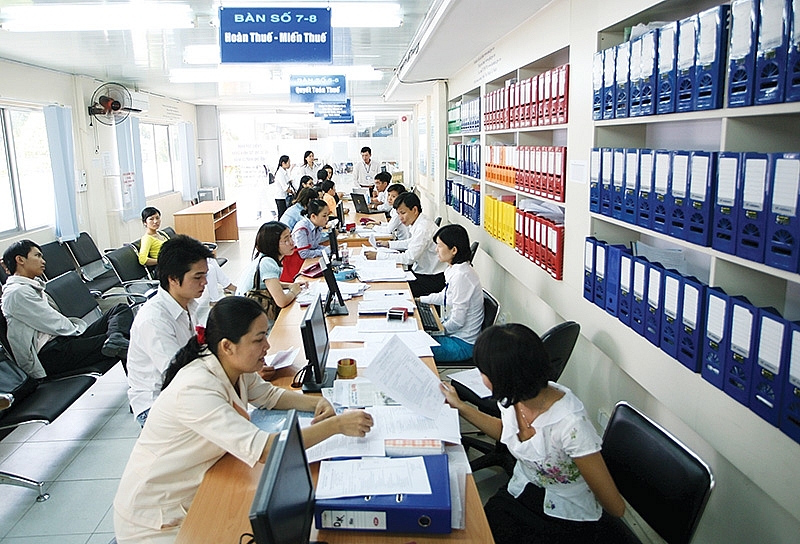ASEAN-wide tax analysis urged
 |
| ASEAN member states have set differing rates for corporate income tax, photo Le Toan |
ASEAN countries are currently far apart on many macro-level indicators, with each country tending to prioritise its own interests when implementing fiscal policies and compete for gains, rather than sitting down with its neighbours and designing a mechanism for the common good, according to a new report.
Published by Oxfam and the Vietnam Institute for Economic and Policy Research, the report on sustainable tax policies and incentives in ASEAN explains that countries have set varying standard rates for corporate income tax (CIT), determined by numerous factors depending on the priorities of the government, levels of development, and the nature of the economy.
The average standard CIT rate across the region has been gradually falling, from 25.1 per cent in 2010 and 22.6 per cent in 2015 to 21.7 per cent this year. The average rate in 2020 is 1.7 percentage points lower than the average rate in selected countries in the East Asia-Pacific region.
The report confirmed that Laos, Thailand, and Vietnam have seen the sharpest declines in their standard CIT rates over the past 10 years at 35 to 20 per cent for Laos, 30 to 20 per cent for Thailand, and 25 to 20 per cent for Vietnam. Meanwhile Indonesia has seen its rate decline by three percentage points and Malaysia by one point, with rates of 22 per cent and 24 per cent, respectively in 2020.
Singapore offers the lowest CIT rate of any ASEAN country at 17 per cent of taxable corporate income, and this has remained unchanged for the past 10 years. Brunei’s rate of 18.5 per cent is the second lowest.
Experts and researchers have said that the decline of CIT has contributed to the fiscal pressure of ASEAN countries, where spending in essential services such as healthcare, education, and social protection is still not meeting the needs in most countries in the region.
One of the biggest challenges for member states, they explain, is how to come together and address complex emerging issues at the regional level, in particular corporate tax incentives. However, if ASEAN wants to remain cohesive, its member states must converge.
To resolve these obstacles, member states are being recommended to draw up a whitelist and a blacklist of tax incentives.
“ASEAN members should draw up a blacklist of all tax incentives that should no longer be allowed and establish a plan to phase them out across the region by a certain date. In parallel with this, they should agree on a whitelist of tax incentives that are acceptable and allowed,” explained Nguyen Quang Thai, a researcher at Oxfam Vietnam.
According to Thai, the blacklist should include first and foremost profit-based tax incentives – for example, incentives that offer a low rate of tax on profit made such as tax holidays, significant tax exemptions, loss carry-backs, and preferential rates.
In recent years, academics and international organisations had already called on countries in ASEAN to stop offering these kinds of incentives due to their harmful nature and marginal positive effects.
Meanwhile, a whitelist should include investment-based tax incentives – for example, those that focus on the investment itself. Such incentives are proven to be much more productive than profit-based equivalents. However, these incentives should be monitored for the effectiveness and abuses should be avoided, such as super deductions or super tax credits.
“A mechanism should be put in place at the ASEAN level to monitor developments in tax policy and to decide which incentives should be blacklisted or whitelisted. This mechanism should be transparent and involve technical experts from governments, civil society, and academia in its operation,” Thai added.
Meanwhile, Pham Van Long from the Vietnam Institute for Economic and Policy Research agrees with a minimum tax standard across the ASEAN region. “The race to the bottom across ASEAN needs to stop, and while international policy developments towards a worldwide minimum tax rate are ongoing, countries need to agree on an approach tailored to the region at a possible range of 12.5 to 20 per cent,” Long said.
What the stars mean:
★ Poor ★ ★ Promising ★★★ Good ★★★★ Very good ★★★★★ Exceptional
 Tag:
Tag:
Themes: Drive ASEAN Forward
Related Contents
Latest News
More News
- France supports Vietnam’s growing role in international arena: French Ambassador (January 25, 2026 | 10:11)
- Foreign leaders extend congratulations to Party General Secretary To Lam (January 25, 2026 | 10:01)
- Russian President congratulates Vietnamese Party leader during phone talks (January 25, 2026 | 09:58)
- Worldwide congratulations underscore confidence in Vietnam’s 14th Party Congress (January 23, 2026 | 09:02)
- Political parties, organisations, int’l friends send congratulations to 14th National Party Congress (January 22, 2026 | 09:33)
- 14th National Party Congress: Japanese media highlight Vietnam’s growth targets (January 21, 2026 | 09:46)
- 14th National Party Congress: Driving force for Vietnam to continue renewal, innovation, breakthroughs (January 21, 2026 | 09:42)
- Vietnam remains spiritual support for progressive forces: Colombian party leader (January 21, 2026 | 08:00)
- Int'l media provides large coverage of 14th National Party Congress's first working day (January 20, 2026 | 09:09)
- Vietnamese firms win top honours at ASEAN Digital Awards (January 16, 2026 | 16:45)


















 Mobile Version
Mobile Version